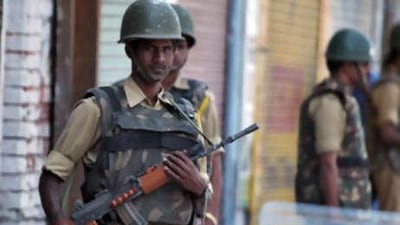SRINAGAR, INDIA // Security forces fired tear gas and used batons to try to break up protests in Kashmir today, hours after authorities imposed an indefinite curfew in Muslim-majority areas of the volatile Himalayan region. The curfew comes amid a weekend general strike in the region's main city and the largest protests against Indian rule in more than a decade, intensifying the turmoil that has roiled the region for almost two months.
Police drove through neighbourhoods in the mainly Muslim Kashmir Valley before dawn today announcing the curfew and warning residents to stay indoors. Thousands of security forces patrolled the deserted streets of Srinagar, the largest city. The curfew does not apply to areas outside the valley, which have large Hindu populations and have been largely peaceful during the past two days. Police warned that "stern action will be taken against violators" of the curfew. "We have also called in the army to assist the police in enforcing law and order," said Botlagauduru Srinivas, a senior police officer.
Thousands of people took to the streets of Handwara, a town 100km north of Srinagar, to defy the curfew. The demonstrators chanted pro-independence slogans and alleged that government forces had desecrated the Quran, the Muslim holy book. Mr Srinivas called the allegation "totally baseless." Security forces fired tear gas and used batons to stop the protesters, Mr Srinivas said. There were no immediate reports of injuries.
In Srinagar, chants of "we want freedom" could be heard from public announcement systems at mosques which also exhorted people to defy the curfew. At least 10 journalists, who were outside during the curfew, were beaten by paramilitary soldiers and three of them were hospitalised, according to Farooq Khan, the president of Kashmir press photographers association. Prabhakar Tripathi, a spokesman for Central Reserve Police Force, said authorities were investigating the incidents.
A government statement called the curfew a "precautionary measure," saying it had information that separatist leaders could face threats from "vested interests." It did not give any other details, but officials usually describe armed Kashmiri militant groups as "vested interests." Mirwaiz Omer Farooq, a key separatist leader, dismissed the government statement. "If at all we have threats from any quarter, it's from Indian forces," he said. "The government is unnerved by the nonviolent mass uprising and is now trying to use its old tactic to try to break the will of people," Mr Farooq said, referring to the curfew.
Separatists have called for a sit-in protest in Srinagar tomorrow and Mr Farooq said they would defy the curfew and go ahead with their plan. A mass protest on Friday was the largest in two months of angry rallies that have rocked the Indian portion of Kashmir, pitting the region's Muslim majority against the Hindu minority. An estimated 275,000 people gathered in Srinagar for the rally called by a coalition of separatist political parties. The crisis began in June when Muslims demonstrated over a government decision to transfer land to a Hindu shrine that they said was actually a settlement plan meant to alter the religious balance in the region.
After the plan was rescinded, Hindus took to the streets of Jammu, a predominantly Hindu city, demanding it be restored. The unrest has left at least 34 people dead, mainly protesters. There is a long history of separatist movements in Kashmir, which has been divided between India and Pakistan since 1948. * AP

